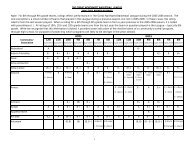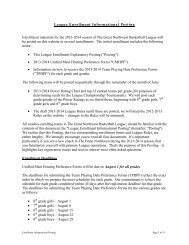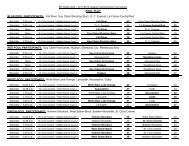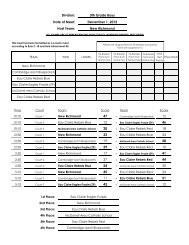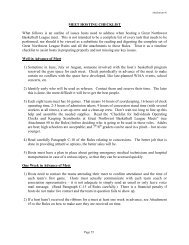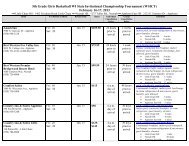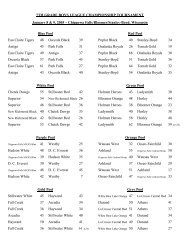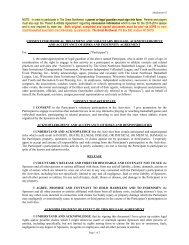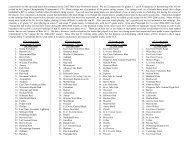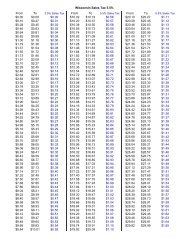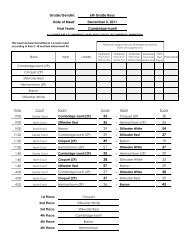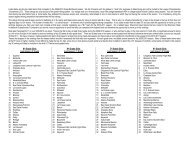THE GREAT NORTHWEST BASKETBALL LEAGUE
THE GREAT NORTHWEST BASKETBALL LEAGUE
THE GREAT NORTHWEST BASKETBALL LEAGUE
You also want an ePaper? Increase the reach of your titles
YUMPU automatically turns print PDFs into web optimized ePapers that Google loves.
2011-2012 Season<br />
GNBL Rules<br />
2) Length of Game. Each game will consist of four, seven minute periods with clock stoppages for<br />
all time-outs, out of bounds plays, possession arrow changes, free throws and all other times a<br />
game clock is normally stopped under official basketball rules. For all grade levels, if one team is<br />
behind by more than fifteen points after the third period, the fourth period may be played using a<br />
running clock. If this happens, the running clock will be used for the full fourth period, even if<br />
the losing team closes the margin to less than sixteen points at some point during the fourth<br />
period. Where the running clock is used in the fourth period, the clock will be stopped only for<br />
time-outs taken by one of the teams, substitutions, an injury on the court or for any other reason<br />
that the referees decide to call an official's time-out. The coach of the losing team, at his or her<br />
sole discretion, has the option of waiving the running clock rule, provided that the meet at that<br />
point is running on time or ahead of schedule. The clock operator will ask the head coach of any<br />
team losing by sixteen or more points at the end of the fourth quarter whether he/she wants the<br />
clock run. The only time that the clock will be run without the consent of the losing team's coach<br />
is if the Tournament Director (not the game officials) feels the clock must be run to help get a<br />
meet that is running behind back on schedule.<br />
3) Overtime. If a game is tied at the end of regulation, the teams will play one two-minute<br />
overtime. During the first three rounds of an eight-team meet (group or pool play), any fourth<br />
grade meet, fifth grade three-game meet, five-team mini-meet, six-team meet or seven-team<br />
reformatted meet, if a game is still tied at the end of the first overtime, there will be a three point<br />
sudden death overtime period, in which the first team to score three points, by whatever means,<br />
will win the game. This same procedure will be used in the tournament-style fourth round at<br />
standard eight-team meets for the seventh, fifth and third place games. However, in the<br />
championship game of an eight-team meet, the teams will continue to play full overtime periods<br />
until the game is decided. In the championship game, if after any given full overtime period, the<br />
competing coaches decide to use the three point sudden death rule, they can do so, but only if<br />
both are in agreement. There will be a jump ball at the beginning of each overtime period.<br />
4) Zone Defenses. Zone defenses will be allowed in 7 th and 8 th grade meets, but generally not in 6 th<br />
and 5 th grade meets (except during certain press situations as described in Paragraph D-5). Zone<br />
defenses of any kind are prohibited in 4 th grade meets.<br />
For purposes of 6 th grade, 5 th grade and 4 th grade meets, a player will be deemed to be playing a<br />
zone if he or she does not come half way out from the basket in defending the person he or she is<br />
guarding. If the person being guarded is further away from the basket than the 3-point arc, the<br />
defender need only come half way between the basket and the three-point arc, not half way from<br />
the basket to the person being guarded. The defender on the weak side (the side of the court<br />
opposite the ball) must also come out towards the player he/she is guarding (not the ball), at least<br />
halfway between the basket and the arc. When a player on the offensive team below the top of<br />
the key (i.e. where the three-point arc intersects the jump circle above each free throw line) drives<br />
to the basket, defenders can double-team the ball (or even triple, quadruple, or quintuple team the<br />
ball). When that happens, defenders on the weak side have a choice when the ball moves toward<br />
the basket – they can guard their man or they can double-team the ball – but they cannot stand in<br />
the lane part way in between and play a spot on the floor. A good switching, double-teaming<br />
defense is generally not illegal; a team that sets up to play a spot on the floor, rather than a<br />
specific opponent, will be considered to be violating this rule.<br />
In 4 th grade meets, and in those situations in 6 th and 5 th grade meets where a full court press is not<br />
allowed (see Paragraph D-5 of these rules), when the ball is being brought over the half court line<br />
by the offensive team, the defensive team cannot double team the ball above the top of the key,<br />
unless the offensive team first brings up a player to set a pick for the ballhandler, in which case<br />
both defensive players (the one guarding the ballhandler and the other guarding the player setting<br />
the pick) can double team the ballhandler.<br />
26



